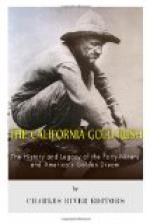Hittell tells of one ingenious citizen who, in trying to keep ahead of his fellow immigrants as he hurried along, had the bright idea of setting on fire and destroying the dry grass in order to retard the progress of the parties behind. Grass was scarce enough in the best circumstances, and the burning struck those following with starvation. He did not get very far, however, before he was caught by a posse who mounted their best horses for pursuit. They shot him from his saddle and turned back. This attempt at monopoly was thus nipped in the bud.
Probably there would have been more of this sort of thing had it not been for the constant menace of the Indians. The Indian attack on the immigrant train has become so familiar through Wild West shows and so-called literature that it is useless to redescribe it here. Generally the object was merely the theft of horses, but occasionally a genuine attack, followed in case of success by massacre, took place. An experience of this sort did a great deal of good in holding together not only the parties attacked, but also those who afterwards heard of the attempt.
There was, however, another side to the shield, a very encouraging and cheerful side. For example, some good-hearted philanthropist established a kind of reading-room and post-office in the desert near the headwaters of the Humboldt River. He placed it in a natural circular wall of rock by the road, shaded by a lone tree. The original founder left a lot of newspapers on a stone seat inside the wall with a written notice to “Read and leave them for others.”
Many trains, well equipped, well formed, well led, went through without trouble—indeed, with real pleasure. Nevertheless the overwhelming testimony is on the other side. Probably this was due in large part to the irritability that always seizes the mind of the tenderfoot when he is confronted by wilderness conditions. A man who is a perfectly normal and agreeable citizen in his own environment becomes a suspicious half-lunatic when placed in circumstances uncomfortable and unaccustomed. It often happened that people were obliged to throw things away in order to lighten their loads. When this necessity occurred, they generally seemed to take an extraordinary delight in destroying their property rather than in leaving it for anybody else who might come along. Hittell tells us that sugar was often ruined by having turpentine poured over it, and flour was mixed with salt and dirt; wagons were burned; clothes were torn into shreds and tatters. All of this destruction was senseless and useless, and was probably only a blind and instinctive reaction against hardships.
Those hardships were considerable. It is estimated that during the height of the overland migration in the spring of 1849 no less than fifty thousand people started out. The wagon trains followed almost on one another’s heels, so hot was the pace. Not only did the travelers wish to get to the Sierras before the snows blocked the passes, not only were they eager to enter the gold mines, but they were pursued by the specter of cholera in the concentration camps along the Mississippi Valley. This scourge devastated these gatherings. It followed the men across the plains like some deadly wild beast, and was shaken off only when the high clear climate of desert altitude was eventually reached.




